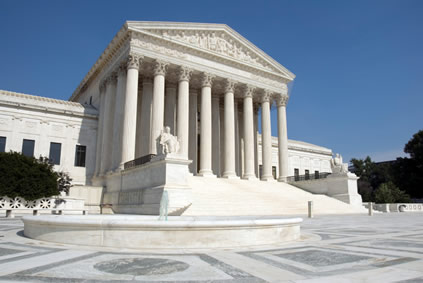Private: Supreme Court Agrees to Hear Landmark Church–State Case Court to decide whether secular graduation can be held in a church
Media Contact
Ryan Colby 202-349-7219 media@becketlaw.org
Additional Information

Washington, DC – Today, the U.S. Supreme Court agreed to accept a landmark First Amendment case on the relationship between church and state. The central question is whether a Wisconsin high school violated the Constitution by holding graduation in a rented church auditorium instead of the school’s gym, which lacked adequate air conditioning, parking, and seating. (See video footage of the graduation here.)
“This case has the potential to become one of the most significant church–state cases in many years,” said Luke Goodrich, Deputy General Counsel at Becket. “The issue at stake in the case is fundamental: Can the government treat religion as a normal part of public life, or must it treat religion as something harmful that should be avoided?”
The case began in 2009, when a secularist organization sued two Wisconsin high schools for their decade-old practice of holding high school graduations in a rented church auditorium. The schools rented the auditorium at the request of their students, who complained that the alternative facilities—the school gymnasiums—were uncomfortable, lacked air conditioning, and lacked adequate space for friends and family to attend. All of the graduation events were completely secular, with no prayers or religious references ever made.
After several years of litigation, a sharply divided United States Court of Appeals for the Seventh Circuit ruled that renting the church auditorium was unconstitutional. Although the graduation events were completely secular, the Court held that the “pervasively religious environment” of the auditorium—which included a large cross, Bibles and hymnals in the pews, and church brochures in the lobby—created the risk that graduating students would “perceive the state as endorsing a set of religious beliefs.” Judges Ripple, Posner, and Easterbrook dissented, arguing that the court’s ruling would expose school districts across the country to liability and showed unnecessary hostility to churches.
“Public schools across the country rely on churches to provide a comfortable, cost-effective facility for graduation ceremonies,” said Goodrich. “Religion is not asbestos, and the Constitution does not require the government to treat churches as contaminated buildings that are uniquely unfit for public events.”
Public schools have held graduation events in churches for almost 100 years. The Wisconsin Supreme Court first upheld the practice in 1916; the New Mexico Supreme Court upheld it in 1952. The Seventh Circuit’s decision is the first appellate decision in the country striking down the practice as unconstitutional.
Briefing in the case will likely take place over the summer of 2013, with the Supreme Court hearing oral argument in the fall.
The lead attorney in the Supreme Court appeal, Michael McConnell, is a former judge on the United States Court of Appeals for the Tenth Circuit, a leading constitutional law scholar, and a veteran of over a dozen Supreme Court arguments. Becket is a non-profit law firm dedicated to protecting the free expression of all religious traditions; most recently, it won a 9-0 Supreme Court victory in Hosanna-Tabor v. EEOC, which the Wall Street Journal called one of “the most important religious liberty cases in a half century.” Kirkland & Ellis is an international law firm with one of the premier appellate and Supreme Court practices in the country. Axley Brynelson is a leading Wisconsin law firm that represented the school district in the Seventh Circuit.
Becket is a non-profit, public-interest law firm dedicated to protecting the free expression of all religious traditions—from Anglicans to Zoroastrians. For 18 years its attorneys are recognized as experts in the field of church-state law. For more information, or to arrange an interview with one of the attorneys, please contact Melinda Skea at media@becketlaw.org or call 202.349.7224.
###